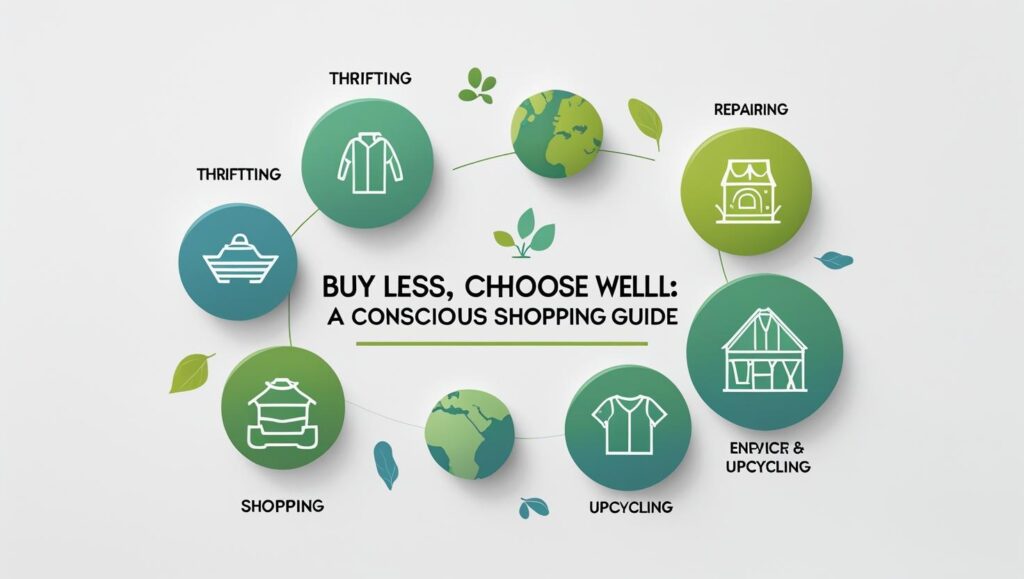Buy Less, Choose Well: A Conscious Shopping Guide for a Sustainable Lifestyle
In a world saturated with fleeting trends and fast consumption, a powerful counter-movement is gaining momentum: the philosophy of **”Buy Less, Choose Well.”** This isn’t just a catchy phrase; it’s a revolutionary approach to shopping that challenges us to rethink our relationship with material possessions. Instead of succumbing to the endless cycle of acquiring and discarding, it invites us to make thoughtful, intentional choices that benefit our wallets, our well-being, and the planet. If you’re tired of clutter, worried about environmental impact, or simply seeking more meaning in your purchases, this conscious shopping guide will equip you with the knowledge and tools to embrace a more sustainable and fulfilling lifestyle. Let’s explore how to shift from impulsive buying to mindful investment, creating a life rich in quality, not quantity.
The Problem with Overconsumption: More Than Just Clutter
The modern consumer landscape often encourages a culture of excess. Fast fashion, disposable electronics, and fleeting trends push us to constantly update our belongings. This relentless cycle of consumption has far-reaching consequences that extend beyond overflowing closets and credit card bills. Environmentally, it leads to resource depletion, increased waste in landfills, and significant carbon emissions from manufacturing and transportation. Socially, it often relies on exploitative labor practices in distant factories. Personally, it can fuel a sense of dissatisfaction, as the fleeting joy of a new purchase quickly fades, leaving us yearning for the next one. Understanding these hidden costs is the first step towards embracing a more conscious approach to shopping.
The Environmental Footprint of “Fast Everything”
From the water-intensive cultivation of cotton for cheap t-shirts to the energy consumed in producing plastic gadgets, every item we buy carries an environmental burden. When these items are designed to be discarded quickly, the cumulative impact becomes staggering. Landfills groan under the weight of textile waste, electronic junk, and single-use plastics. The “fast everything” culture contributes significantly to climate change, pollution, and biodiversity loss. Recognizing this direct link between our purchasing habits and planetary health is crucial for inspiring change.
Embracing the “Buy Less, Choose Well” Philosophy
So, how do we transition from thoughtless consumption to a more intentional approach? The “Buy Less, Choose Well” philosophy is built on several key principles:
1. Quality Over Quantity: Investing in Longevity
Instead of buying five cheap items that will quickly wear out, invest in one high-quality item designed to last. This applies to everything from clothing and furniture to electronics and kitchenware. High-quality items often come with better craftsmanship, durable materials, and timeless designs, meaning you’ll use them for years, reducing the need for constant replacements. Think of it as an investment that pays dividends in both durability and environmental savings.
Identifying Quality: What to Look For
- Materials: Opt for natural, durable fibers like organic cotton, linen, wool, or Tencel for clothing. For other goods, consider wood, stainless steel, glass, or ethically sourced metals.
- Construction: Examine seams, stitching, and joinery. Are they sturdy and well-finished? For electronics, check reviews for longevity and repairability.
- Brand Reputation: Research brands known for their quality, ethical practices, and transparency.
- Timeless Design: Choose classic styles over fleeting trends to ensure items remain relevant and appealing for longer.
2. Know Your “Why”: Intentional Purchasing
Before making a purchase, pause and ask yourself: “Why do I need this?” Is it a genuine need, or is it an impulsive desire fueled by advertising or peer pressure? Practicing mindful consumption means understanding the purpose behind each purchase. Create a shopping list, stick to it, and avoid Browse purely for entertainment. This intentionality helps you avoid unnecessary acquisitions and focus on what truly adds value to your life.
3. Research and Transparency: Be an Informed Consumer
In today’s interconnected world, there’s no excuse for ignorance. Research the brands you support. Are they ethical? Do they pay fair wages? What are their environmental policies? Look for certifications like Fair Trade, B Corp, or GOTS (Global Organic Textile Standard) that indicate a commitment to social and environmental responsibility. Your purchasing power is immense; use it to support businesses that align with your values.
4. Embrace Secondhand and Circularity: The Power of Pre-loved
The most sustainable item is often one that already exists. Explore thrift stores, consignment shops, online marketplaces, and vintage stores for unique finds. Buying secondhand not only saves money but also significantly reduces the demand for new production and keeps items out of landfills. Furthermore, consider supporting brands that offer repair services, take-back programs, or participate in circular economy initiatives, ensuring products can be reused or recycled at the end of their life.
5. Care for What You Own: Extend Lifespan
The lifespan of your possessions isn’t just about initial quality; it’s also about how you care for them. Learn proper washing techniques for clothes, store items appropriately, and perform regular maintenance on appliances. Learn basic mending skills or support local repair shops. Extending the life of your belongings reduces the need for replacements and minimizes waste.
6. Define Your Personal Style and Needs: Avoid Trend Traps
For clothing, cultivate a personal style that reflects who you are, rather than blindly following trends. Build a versatile capsule wardrobe with pieces that mix and match easily. For home goods, choose items that genuinely fit your living space and lifestyle. When you understand your own needs and preferences, you’re less likely to be swayed by fleeting fads and more likely to invest in items you’ll truly love and use.
Beyond Shopping: A Holistic Approach to Sustainable Living
The “Buy Less, Choose Well” philosophy is a cornerstone of a broader sustainable lifestyle. It often goes hand-in-hand with other eco-conscious habits, such as:
- Reducing Waste: Embracing reusable bags, water bottles, coffee cups, and food containers.
- Eating Sustainably: Choosing local, seasonal, and plant-based foods to reduce your food’s carbon footprint.
- Conserving Energy: Being mindful of electricity and water usage in your home.
- Supporting Local: Buying from local businesses and artisans strengthens your community and reduces transportation emissions.
- Experiencing Over Owning: Prioritizing experiences, relationships, and personal growth over material accumulation.
Adopting the **”Buy Less, Choose Well”** mindset is a journey, not a destination. It requires a shift in perspective, a willingness to challenge societal norms, and a commitment to mindful choices. By prioritizing quality, purpose, and sustainability in our purchases, we not only reduce our environmental impact and save money but also cultivate a deeper appreciation for the things we own. This conscious approach leads to a less cluttered home, a lighter footprint on the planet, and ultimately, a more fulfilling and intentional life. Start by making one small change today, and watch as your consumption habits transform into a powerful force for good. Your wallet, your well-being, and the planet will thank you.



